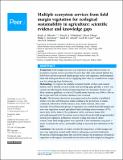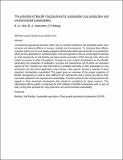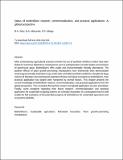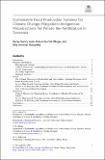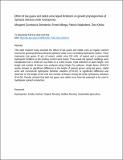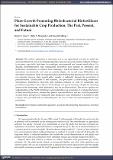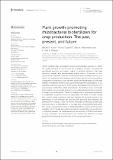Search
Now showing items 1-10 of 16
Pesticidal Plant Extracts Improve Yield and Reduce Insect Pests on Legume Crops Without Harming Beneficial Arthropods
(Original Research, 2018-09-28)
In the fight against arthropod crop pests using plant secondary metabolites, most
research has focussed on the identification of bioactive molecules. Several hundred
candidate plant species and compounds are now known ...
Multiple ecosystem services from field margin vegetation for ecological sustainability in agriculture: scientific evidence and knowledge gaps.
(PubMed, 2019-11-28)
Background Field margin and non-crop vegetation in agricultural systems are potential ecosystem services providers because they offer semi-natural habitats for both below and above ground animal groups such as soil organisms, ...
The potential of Bacilli rhizobacteria for sustainable crop production and environmental sustainability.
(Elsevier, 2019-02-01)
Conventional agricultural practices often rely on synthetic fertilizers and pesticides which have immense and adverse effects on humans, animals and environments. To minimize these effects, scientists world over are now ...
Status of biofertilizer research, commercialization, and practical applications: A global perspective
(Elsevier Inc., 2021)
Most contemporary agricultural practices involve the use of synthetic fertilizers which have been linked to numerous deleterious consequences such as eutrophication of water bodies and emission of greenhouse gases. ...
Sustainable Food Production Systems for Climate Change Mitigation: Indigenous Rhizobacteria for Potato Bio-fertilization in Tanzania
(Springer Nature, 2021-03-26)
The global rise in human population has led to the intensification of agricultural
activities to meet the ever-rising food demand. The potato (Solanum tuberosum L.)
is a crop with the potential to tackle food security ...
Endophytic Rhizobacteria for Mineral Nutrients Acquisition in Plants: Possible Functions and Ecological Advantages
(Springer Nature Switzerland AG., 2021-03-05)
Nutrient-deficiency in agricultural soils is a major problem in many parts of the world, it is, therefore, artificial fertilizers are widely used to boost crop production. Unfortunately, these fertilizers are associated ...
Effect of bat guano and rabbit urine liquid fertilizers on growth physiognomies of Spinacia oleracea under hydroponics
(Current Horticulture, 2021-12-03)
This pilot research study assessed the effect of bat guano and rabbit urine as organic nutrient sources for growing Spinacia oleracea (spinach) under a non-circulating hydroponic system. Three treatments; bat guano (5 g/L ...
Farmers’ Knowledge, Perceptions and Practices in Managing Weeds and Insect Pests of Common Bean in Northern Tanzania
(MDPI, 2019-07-28)
Weeds and insect pests are among the serious constraints in common bean production
in most rural communities. A survey of 169 smallholder farmers was conducted in two common
bean-growing districts in northern Tanzania. ...
Plant Growth Promoting Rhizobacterial Biofertilizers for Sustainable Crop Production: The Past, Present, and Future
(Preprints, 2020-09-26)
The world’s population is increasing and so are agricultural activities to match the growing demand for food. Conventional agricultural practices generally employ artificial fertilizers to increase crop yields, but these ...
Plant growth-promoting rhizobacterial biofertilizers for crop production: The past, present, and future
(Frontiers, 2022-09-16)
Recent decades have witnessed increased agricultural production to match
the global demand for food fueled by population increase. Conventional
agricultural practices are heavily reliant on artificial fertilizers that ...


